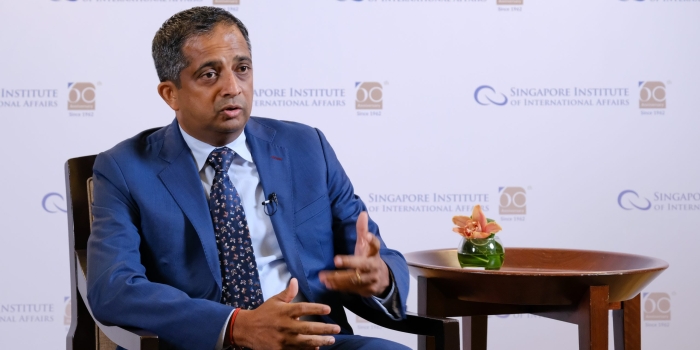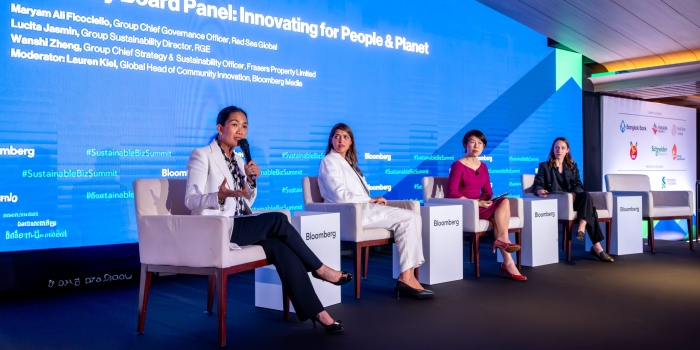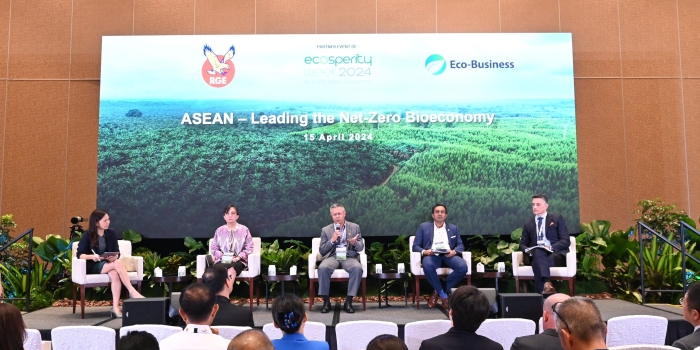More than 300 ASEAN stakeholders attended the 10th Singapore Dialogue on Sustainable World Resources (SWR), which was held in Singapore on June 9 at the Fullerton Hotel. Delegates included leading decision-makers from government agencies, agribusiness and forestry sectors, financial institutions, non-governmental organisations, as well as academics and members of the media. RGE served as the lead sponsor for the event, which was organised by the Singapore Institute of International Affairs. The event presented an opportunity to retrospectively evaluate the progress made in ASEAN’s agribusiness sector towards achieving sustainability.
Mr Pratheepan Karunagaran, Executive Director at Apical, participated in a panel discussion on what the commodities sector can do to help the industry realise a net zero transition and further uplift their sustainability commitments. The panel was moderated by Ms Khor Yu Leng, Director of the Singapore Institute of International Affairs. During the discussion, titled ‘What can the Commodities Sector do for the Net Zero Transition’, key speakers discussed how businesses within the commodities sector are actively decarbonising their operations, and how they can play a role in achieving carbon neutrality through carbon accounting and environmental stewardship.
The rising demand for renewable energy in the aviation industry
During his opening remarks, Mr Karunagaran addressed the growing need for the industry to expand its production capabilities, given the rising demand for energy in the near future. “The aviation industry alone will need about 500 million tonnes of jet fuel by 2030, of which approximately 20-25 million tonnes will come from sustainable aviation fuel,” he said. “When you add the land transport requirement of renewable diesel, that’s another 25 to 30 million tonnes of hydrogenated vegetable oil (HVO).” Citing the inevitable rise in demand, he urged change in the industry – to look at developing novel ways of increasing yields through sustainable and circular production methods.
“What is exciting is the possibility of utilizing our waste and residue streams within the market supply chain, and seeing how we can best use them to add value”. Mr Karunagaran also discussed Apical’s joint venture with Spanish energy company Cepsa to develop a second-generation biofuels plant in Southern Spain, which will have a capacity of 500,000 tons of renewable diesel and sustainable aviation fuel. He said the facility will be the largest aviation fuel processing facility in Southern Europe.
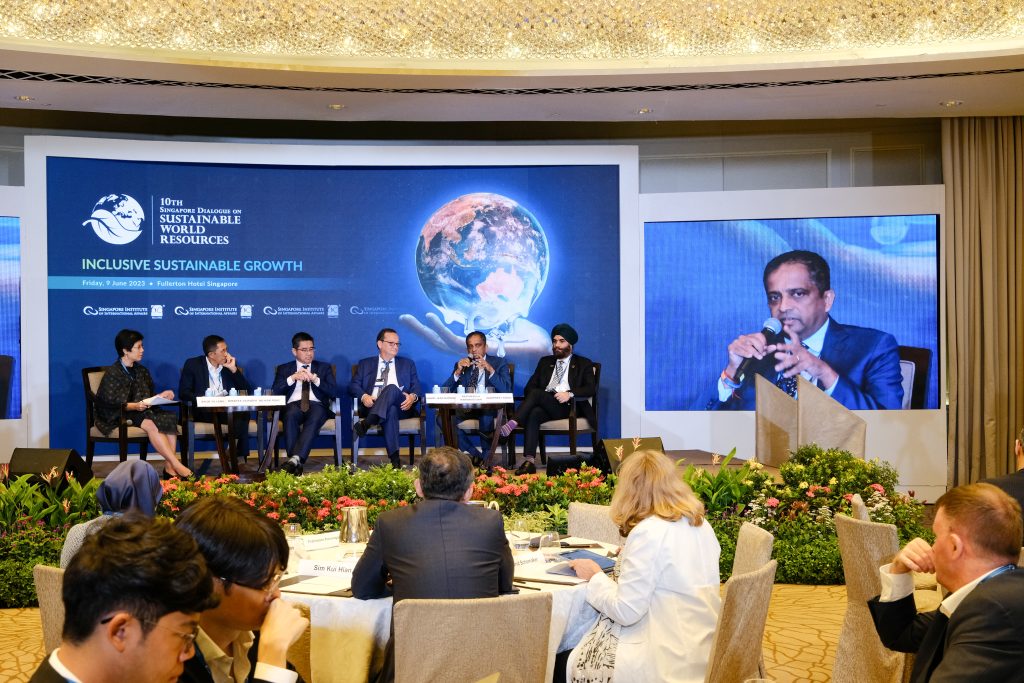
Mr Pratheepan Karunagaran (second from right), Executive Director of Apical, speaking on a panel at the 10th Singapore Dialogue on Sustainable World Resources
Attitudes towards palm oil production
Another key point that the panelists discussed was the issue of industry attitudes towards palm oil production, and its perception as a leading cause of deforestation. “Palm has the lowest footprint but actually delivers the highest output,” Chief Sustainability Officer, Kuala Lumpur Kepong Berhad (KLK), Mr Kok Ku Peng, said. “It takes up 0.6% of agricultural land but provides 36% of global oil supply.”
“Palm has achieved, in some areas, as much as 80% greenhouse gas savings versus a diesel reference,” Mr Henri-Jean Bardon Director of Biofuels Platform, ACX, said. He shared that biofuels are, in his opinion, one of the most feasibility-scrutinised products in the world. Mr Kok also called for a new look at the industry baseline for carbon emissions from palm, citing that they are currently “not realistic”.
Apical’s SMILE program and traceability
Following up on the panel discussion on the oleochemical industry in Indonesia, Mr Karunagaran said about 40% of the Indonesian production comes from smallholders. He shared details on Apical’s Smallholder Inclusion for better Livelihood & Empowerment (SMILE) program, which aims to improve the lives of nearly 10,000 Indonesian smallholders by increasing their productivity and facilitating industry certification. “There is great benefit in improving their livelihood. It is critical to make this point clear,” he said, reiterating Apical’s commitment to circular production and helping local communities in the biofuel supply chain.
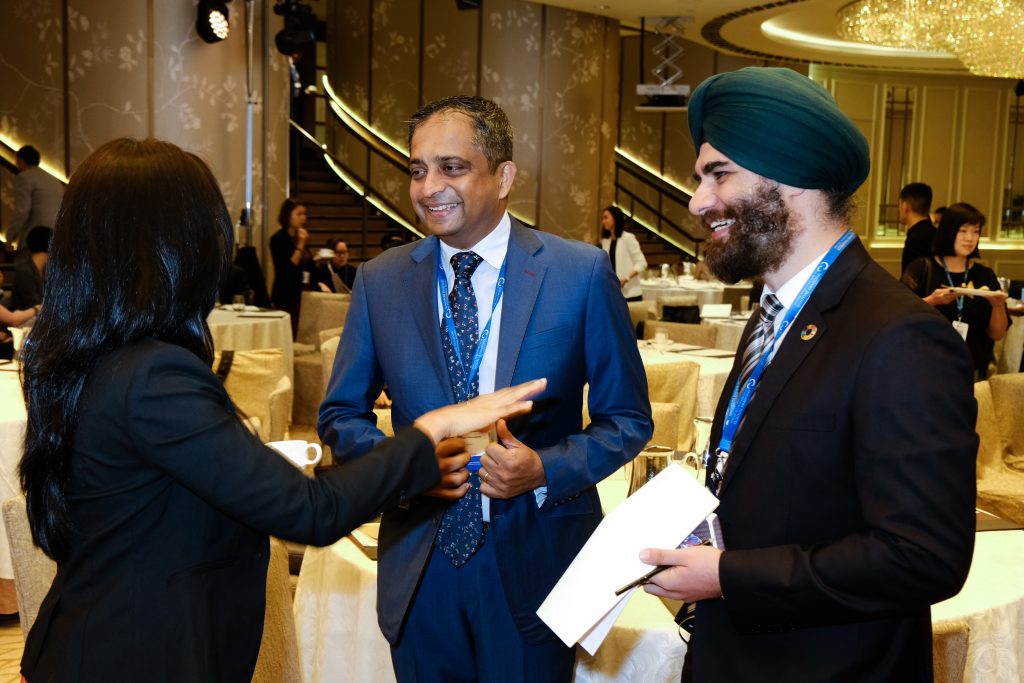
Mr Pratheepan Karunagaran (centre), Executive Director, Apical, and Mr Amanpreet Singh (right), Director & Deputy Head, ESG Finance APAC, MUFG, pictured socialising at the Singapore Institute of International Affairs event
Mr Karunagaran underscored the significance of material traceability, another rising trend across the entire oleochemical industry. “Bringing legitimacy to the supply chain is of utmost importance,” he said. He noted the sector-wide need for increased transparency, and the role that governing bodies play in implementing partnerships and legislation to facilitate it. When considering the importance of palm oil to the industry, Mr Karunagaran noted the massive importance for Indonesian smallholders, being “completely reliant on the palm.”
He said that Apical was committed to finding sustainable ways of achieving net zero goals and reiterated Apical’s unique position as one of the leading global suppliers of vegetable oil and an integrated processor for both up and downstream flows. With the rising importance of environmental, social and governance (ESG) targets and commitments, Apical believes that now is the time to build on the momentum towards carbon-neutrality and net-zero circularity and do more. Leveraging its integrated and manufacturing capabilities, and backed by its scale and global supply chain footprint, the group is firmly positioned to realise a net zero industry future.



